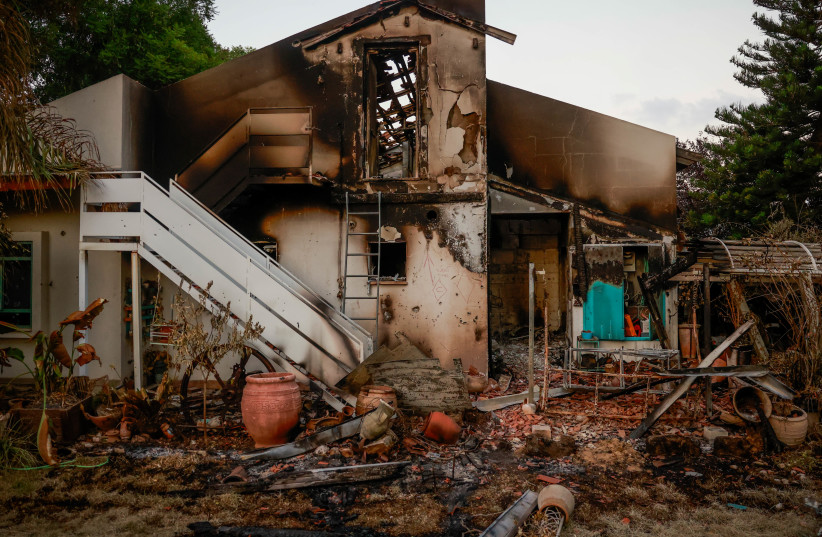There are a few truths that Israel discovered on October 7, but one eclipses all others: no matter what steps Israel takes, its enemies remain resolute in their desire to destroy the Jewish state.
Hamas made this painfully clear. During Benjamin Netanyahu’s tenure as prime minister, Israel tried nearly everything to avoid a large-scale confrontation.
Billions of shekels were funneled into Gaza in a bid to pacify the terrorist group; thousands of Gazans were allowed to work inside Israel; and trade restrictions were eased.
Security barriers and underground walls were constructed, and even military operations, when undertaken, were narrow and carefully restrained to avoid a wider escalation.
Yet, the events of October 7 showed how failed all these efforts had been. When a terrorist organization is driven by a deep-seated desire for your annihilation, no amount of money, economic opportunities, or limited military action will suffice. Hamas’s mission was singular: the destruction of Israel. Nothing else mattered to its leaders.

This reality must guide Israel’s response as it considers the call from France and the United States to pause its strikes against Hezbollah for 21 days – a request that conveniently came out as Netanyahu made his way to New York to address the United Nations.
While public diplomacy is always important, embarking on this trip at such a critical time is irresponsible. The war in the North is escalating, and hostages remain in Hamas captivity in Gaza.
What also must be said is that this speech is not really about defending Israel on the world stage but more about Netanyahu’s political considerations.
If he were truly concerned about international diplomacy, he wouldn’t have allowed the Public Diplomacy Directorate to languish leaderless since the war began.
Even without the speech, there’s a glaring hypocrisy in the global community’s current demands.
For a year, Israel has been under constant rocket fire from Hezbollah.
Over 70,000 people in the North have been displaced, and 44 soldiers and civilians have been killed by the terror group. Yet, despite all of this, Israel has shown restraint, allowing Hezbollah to turn northern Israel into its private shooting range.
Now is not the time to stop the fight
Stopping the fight now would only ensure one thing: another war, whether in a year, five years, or 10.
We know this because it has occurred repeatedly. Every war with Iran’s proxies over the last 25 years has always just been the precursor for the next.
We reach a ceasefire, pass UN resolutions, and convince ourselves that this time it will work. The problem is that it never does.
When Israel withdrew from southern Lebanon in 2000, Hezbollah didn’t waste time; a mere five months later, they abducted three soldiers.
Six years after that, they kidnapped two more, sparking a 34-day war. Now, 18 years later, Israel is once again embroiled in a conflict with Hezbollah.
THE SAME cycle played out in Gaza. Israel pulled out in 2005, and within a year, military operations resumed. Large-scale confrontations occurred in 2006, 2009, 2012, 2014, and again in 2021. Should anyone have been surprised by what happened on October 7?
Israel cannot afford to repeat the mistakes of the past. The same logic that applies to Hamas in Gaza must now be applied to Hezbollah in Lebanon.
Over the past week, Israel has demonstrated remarkable military prowess, targeting Hezbollah’s long-range missile infrastructure and decimating its leadership.
Hassan Nasrallah finds himself increasingly isolated at the top. The IDF has more targets in its sights, but political considerations are holding it back.
There is only one possible justification for halting military operations at this time: the safe return of hostages from Gaza. Beyond that, there is no legitimate reason to stop degrading Hezbollah’s capabilities.
The terrorist group must be weakened to the point that it can no longer pose a serious threat to Israel – neither with rockets nor with cross-border raids.
Indeed, victory in war often paves the way for diplomacy. After all, this was the case after Israel’s victory in the Yom Kippur War in 1973, which persuaded Egypt that peace was in its best interest.
Jordan, too, eventually reached the same conclusion. But the problem with Hamas and Hezbollah is that military victories over them do not alter their fundamental calculus.
They are merely proxies, acting at the behest of their true master – Iran, and Iran’s ambitions remain unchanged.
Instead of confronting Iran’s role in fueling these conflicts, world leaders this week fawned over Iran’s new president on the sidelines of the UN General Assembly.
French President Emmanuel Macron, who is among those calling for a ceasefire in Lebanon, met Masoud Pezeshkian and even spoke about ways to improve bilateral relations between France and Iran.
Did Macron demand an end to Iran’s nuclear ambitions or insist that Iran halt its support for terrorist organizations? No. He simply asked for the release of three French nationals held in Iranian prisons.
Does this sound like a strategy that will compel Iran to change its behavior? Will it prevent Iran from rearming Hezbollah, setting the stage for yet another war in a few years? We all know the answer.
Stopping the war prematurely would be repeating the very mistakes that led to the devastation of October 7. It would give Hezbollah, like Hamas, the opportunity to rebuild, regroup, and prepare for yet another assault against Israel.
October 7 taught us that half-measures will not work.
Victory is the only path to long-term security.
The writer is a senior fellow at the Jewish People Policy Institute (JPPI) and a former editor-in-chief of The Jerusalem Post.
